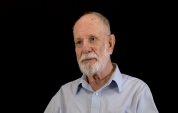6:43 | He was in glider pilot training, but a bad check ride washed him out. Marshall Williams then fell back on a pre-war skill, photography. He switched to the Army Air Force photographic reconnaissance track and became a specialist in that field. (This interview made possible with the support of LORETTA A. ANGERER.)
Keywords : Marshall Williams Ford Trimotor pilot Roswell NM Big Spring TX Greenville SC Clemson dead stick glider Arizona photography Denver CO Colorado Springs CO hernia

It was a converted British liner, so, the American soldiers heading to the European theater were subjected to unfamiliar British food. This caused Marshall Williams to survive for eleven days on crackers from the PX. Once in England, he lucked into a good way to avoid KP. Finally he was assigned to his aerial photo reconnaissance group. (This interview made possible with the support of LORETTA A. ANGERER.)
The aerial war over Europe required an unending series of reconnaissance flights. Marshall Williams was one of those who toiled in a photo lab, processing roll after roll of film that was essential to the war effort. (This interview made possible with the support of LORETTA A. ANGERER.)
Using a mix of British and American aircraft, the 7th Photo Reconnaissance Group supplied images to the 8th Air Force that were essential to the coming invasion of Europe. Marshall Williams describes how the group performed its two missions; mapping and damage assessment. (This interview made possible with the support of LORETTA A. ANGERER.)
For his entire time in the war, Marshall Williams toiled away in a photo lab. From his location near London, he remembers seeing and hearing the German V weapons hit the city. Once the war was over, it was time to just find something to do while you waited to go home. (This interview made possible with the support of LORETTA A. ANGERER.)
Marshall Williams was in the base rec hall in England, listening to a civilian playing the piano and taking requests from the soldiers. After hearing several pop songs, he raised his hand and made his own request. Surprised, the pianist turned around to see who had made such an audacious suggestion. (This interview made possible with the support of LORETTA A. ANGERER.)